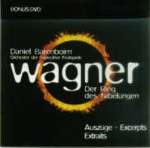I guess that Ring Cycles fall into categories: the tense and intense (Clemens Krauss, Karl Böhm, Joseph Keilberth, Pierre Boulez); epic, broad, and architectural (Wilhelm Furtwängler, Hans Knappertsbusch, Reginald Goodall, James Levine); colorful, poetic, and chamber-like (Herbert von Karajan); big-boned and volatile (Georg Solti); literal (Bernard Haitink, Marek Janowski). And then there’s this Bayreuth Ring led by Daniel Barenboim, recorded in 1991 and 1992. To be sure, it has most in common with the epic group, with a flow as deep and secure as the Rhine, but it is nowhere near as slow, measured, and self-conscious. It has occasional intensity like the first group, but without the speedy tempos; it can be as powerful as the Solti (the close of Rheingold and opening of the third act of Siegfried are huge) and as specifically tinted as Karajan (the strings at Brünnhilde’s awakening are silvery as nowhere else). The orchestral fabric has the transparency of Böhm and Keilberth but is certainly not as chilly as the former and isn’t as exciting as the latter; no-one would accuse this reading of being less than epic but it never seems bloated. It simply seems ideally balanced, with the intimate moments precisely that and the grand statements grand. It isn’t a page-turning tale in the Keilberth/Krauss manner, but we’re always aware of the story being unfolded. In other words, it is very much of no school at all, and it is possibly the most satisfying of modern–that is, non-historical–Ring recordings.
The cast is not ideal or “starry”, and besides John Tomlinson’s Wotan/Wanderer, none of the performances is engraved for the ages. But with only an exception or two, the singers are impossible to complain about. One disappointment is the Wälsung twins–both Elming and Secunde have pitch issues. But even at that, they give committed, interesting portrayals. And Bodo Brinkmann’s Gunther is barked more than it’s sung. Anne Evans’ Brünnhlide is glorious–girlish at first (she and Wotan have a few good laughs in Walküre), more grave as she matures, a complete woman in the final opera. The voice is plush and warm and her singing is always accurate.
As suggested above, Tomlinson is a towering Wotan, with full voice and full range of feelings–arrogance, rage, sadness, warmth, and resignation in equal measure. Siegfried Jerusalem’s Siegfried is wonderfully sung and articulated; his energy level never flags, he is totally involved. If his sound is not quite “heroic” enough, it certainly is everything else needed for this role. Matthias Hölle’s Hunding is properly nasty, his Fasolt rock-solid; Philip Kang is a snide Fafner and a very effective, slick Hagen; Graham Clark is colorful and vicious as Mime; Linda Finnie is a too-young-to-be-cheated-on Fricka; Waltraud Meier’s Waltraute is lived in and vibrant and Birgitta Svenden is not your run-of-the-mill sleepy Erda, but a knowing, all-seeing, sad watchtower. Gunther von Kannen’s Alberich is second on disc only to Gustav Neidlinger. There’s no need to sing the praises of the others: they are as fine an ensemble cast as you’re bound to find.
Sonically, this set has yet to be bettered, with everything clear and balanced but not in a “digital”, artificial way. The singers are never drowned out by the orchestra, but there’s no sense that the engineers had anything to do with it. The strings are, to bring on a metaphor from rock music, a wall of sound, and Barenboim uses them as a cushion for the operas. The rest of the instruments are part of the fabric and always audible. The listener is entirely enveloped. The volume never has to be adjusted; the very soft passages, like the one after the Hagen/Alberich scene, are clear, and the following noisier moments do not have to be turned down. The performances “sound” live.
The operas are complete on 14 CDs and come with a booklet for each opera that contains complete English/German libretto, essays, photos, and a marvelous extra–leitmotifs in the margin. A bonus DVD offers scenes from the videos. This Ring takes the shelf space of only two of the operas and Warner’s price is more than competitive. I can’t say it’s my favorite Ring–that goes to either Keilberth or Krauss; but with the Solti, it’s one of the two most sonically up-to-date. Simply stunning. [2/22/2007]
































